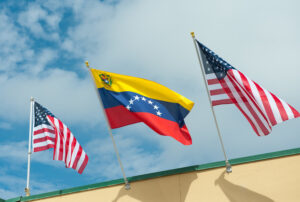U.S. Government Should Support Efforts to Find a Peaceful,
Negotiated Solution
Washington, D.C.—On January 28, the United States government unilaterally announced new sanctions on Venezuela’s state oil company that could dramatically worsen the country’s already dire economic crisis. The measures effectively prevent Venezuela from exporting crude oil to the United States, which is the largest purchaser of its oil. They also prevent U.S. suppliers from selling refined products such as gasoline and diluents necessary for Venezuela to process its heavy crude.
As a research and advocacy organization advancing human rights in the Americas, the Washington Office on Latin America (WOLA) is deeply concerned about the potential for these sanctions to aggravate Venezuela’s humanitarian crisis, and inflict further suffering on the Venezuelan people. WOLA has long condemned Nicolás Maduro’s undermining of democratic institutions and repeated human rights violations, including the Maduro regime’s violence against protesters, crackdown on dissent, and assaults on the democratically-elected National Assembly. We urged the international community to reject the “Constituent Assembly,” which Maduro has used to undercut the democratically-elected legislature and to rewrite the constitution without consulting Venezuela’s people. We also criticized and laid bare the fundamental lack of guarantees in the May 2018 electoral process which Maduro used to claim a new term.
It is clear that Venezuela needs a restoration of democratic order, so that its citizens can choose their own leaders through free and fair elections. As WOLA has asserted in a joint statement with several other leading human rights organizations, and as WOLA Senior Fellow David Smilde and Assistant Director for Venezuela Geoff Ramsey have written in an overview of the current crisis, the international community can and should work together multilaterally to help create the conditions needed for a return to democracy.
However, we are deeply concerned at the potential for the recently announced U.S. sanctions to intensify the severe hardships and suffering that millions of Venezuelans are enduring. Venezuelans are already facing widespread scarcities of essential medicines and basic goods. Venezuela’s oil exports represent the main source of hard currency used to pay for imports. Without this revenue, it is clear that the importation of food and medicine could be put at risk. In turn, this will further accelerate a migration and refugee crisis that has strained neighboring countries and put many of the over 3 million Venezuelan migrants and refugees at risk.
The imposition of these sanctions seemed to be premised on the assumption that they will help usher in a quick return to democracy. The history of broad economic sanctions complicates this idea. In the case of Cuba, sixty years of comprehensive sanctions have hurt the economy and the Cuban people but done nothing to encourage political or economic reforms. In Zimbabwe, Syria, and North Korea, sanctions have punished and weakened populations, leaving their authoritarian governments stronger. For this reason, it is fundamental that the U.S. government ensures that any response to Venezuela’s crisis avoids worsening the humanitarian emergency on the ground. If there is no way for the human cost of these oil sanctions to be avoided, then the measures should be lifted.


